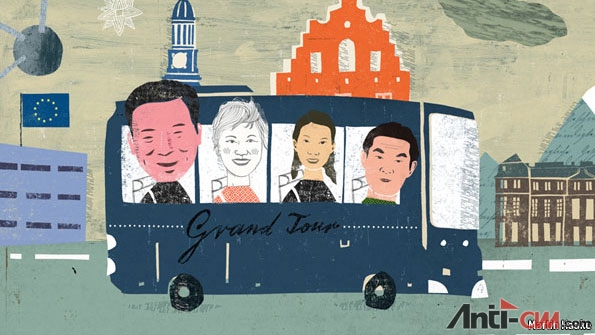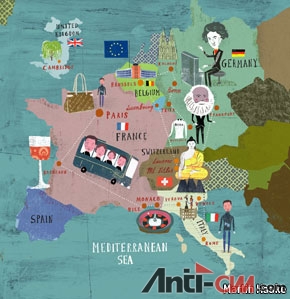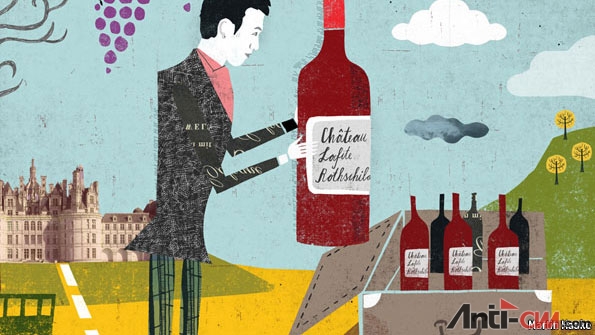【中文标题】新的欧洲大陆之旅
【原文标题】A new Grand Tour
【登载媒体】经济学家
【原文链接】http://www.economist.com/node/17722582?story_id=17722582
中国游客正在开发出一条新的欧洲旅游线路,其中有一些意料之外的目的地。

在英皇书院剑桥的校园中,种着一棵或许是中国最著名的柳树。植下这棵树的人是20世纪诗人徐志摩,他具备了一位持久不衰的名人所需要的所有特质:才华横溢、漂泊不定的爱情生活,以及戏剧性的英年早逝(34岁死于飞机坠毁)。越来越多的中国游客来参观这棵数,和旁边一个刻着徐《康桥再会吧》诗句的大石。
当地的居民和其它游客在走过这棵树时根本不会多看一眼,但是对那些在学校里学习过徐的诗的中国人来说,这个坐落在白色奶牛之间、石拱桥旁的宁静所在,是对青春流逝的怀念。很多人在照相机快门的咔嚓声中和闪光灯的闪烁中感动之情溢于言表。徐的诗帮助剑桥大学在中国树立起崇高的声望,在某种程度上超越了牛津。这也是为什么很多受过教育的中国人了解两所大学间有划艇比赛的原因。
欧洲大陆在中国人心目中依然是旅游梦想的首选地,徐的柳树仅仅是目的地之一。中国新兴的流动中产阶级喜欢成熟的旅游景点,比如埃菲尔铁塔、卢浮宫和威尼斯大运河,但他们同时也开发出一条富有中国快速发展的消费文化、独特的文化、历史和政治品位的旅游路线。这些目的地在中国国内具有令人瞠目结舌的吸引力,而一些欧洲人也无法在地图上找出这些地方究竟在哪里。比如特里尔、麦青根、维罗纳、卢森堡和位于瑞士山区的铁力士山。
几十年来,随着亚洲经济实力的不断强大,政府纷纷出台一些政策,鼓励新富群体到国外度假。日本旅游部实施了“千万项目”,在1986年到1991年期间,让出境游客数量从500万人次提升到1000万人次。韩国的出境游客数量也在十年后激增。这些国家的官员希望,去往世界各地的游客可以成为展示财富的信号,这同时也算是居民在经济急速发展的环境中长时间高压工作后得到的一些回报。在中国,境外旅游在某种意义上说是政府和中产阶级之间缔结的协议中的一部分:前所未有的自由和愉悦,换取持续一党执政的状态。
寻找波尔多葡萄酒和雨果波士
当竹幕(译者注:指在冷战期间东亚共产主义,特别是共产中国政权的势力范围)在一代人之前被掀起的时候,很多人中国人首次接触外部世界都是通过进口商品,这些商品依靠自身过硬的质量赢得了广泛的口碑。即使是今天,中国人从旅游大巴上向外看到的并不是具有悠久历史的城市和国家,而是塞满名牌商品的金光闪闪的购物中心。所谓名牌并不仅仅是商品,中国人的欧洲大陆之旅会造访世界名人的出生地、享誉全球的教育机构——比如剑桥,以及与著名文学作品相关的地点。

如果要描绘一幅中国人在欧洲大陆旅游的草图,那么起始地必然是法国,这个国家被认为具备了欧洲所有的重要优点:历史、浪漫、奢华和质量。像路易威登这样的巴黎商店是必然造访之处,在那里可以见到说普通话的店员。根据免税商店提供的调查数据,中国游客在2009年超过俄罗斯人,成为在法国消费最高的非欧洲旅游群体。法国南部也是旅游热地,这一方面是拜Peter Mayle的《普罗旺斯的一年》有各国语言译本所赐,同时也要感谢在迷笛的熏衣草花园和城堡高墙中拍摄的中国伤情电视剧《一帘幽梦》。
中国新鲜出炉的百万富翁和千万富翁对波尔多酒庄尤其着迷,因为红葡萄酒已经取代了昂贵的白兰地的地位,成为协调商业问题的首选工具。游客们最大奢求莫过于参观(或仅仅是一瞥)罗斯柴尔德拉菲特堡,这里生产的红酒已经成为中国富豪们最热衷炫耀的品牌。参观拉菲特堡是需要预约的,但是中国的准大亨们可等不起。巴黎的Ansel旅行社每年为欧洲带来15000中国游客。一位工作人员Jean-François Zhou近期安排一队游客乘车前往波尔多,在极为简短的参观中,一队游客以每瓶600欧元(790美元)的价格把两箱红酒一抢而空。
离开法国之后,中国游客一般会途径尼斯或者摩纳哥的赌场(中国禁止赌博,但是赌博行为在民间很流行),向南前往意大利。每个国家的游客都会造访威尼斯和罗马,但是中国人的欧洲大陆之旅还必须要到维罗纳。那里有一个景点在吸引他们:一座与《罗密欧与朱丽叶》的故事似乎有些牵强联系的13世纪建筑物。这个作品在中国格外受欢迎,首先因为它是莎士比亚最早被翻译成中文的一批作品之一;其次,故事的内容被认为与中国的传统故事《蝴蝶恋人》(译者注:指《梁山伯与祝英台》)如出一辙。中国游客在一个据说是朱丽叶的阳台下拍照,还会在这个悲剧女主角的铜像旁边留影。然后回到车上,向北前进。
在德国,波恩和特里尔对中国游客的重要性,就像科隆和法兰克福(大量中国航班的停靠地)一样。波恩代表着贝多芬,他在那里的出生地是受过教育的中国人梦寐以求的地点,他们都是经典音乐的忠实拥趸。特里尔吸引中国人的地方不是城市的建筑物和古罗马废墟,而是卡尔马克思故居——这位革命者的出生地。马克思博物院估计每年有13000名中国游客来这里参观,博物馆的游客留言本上全是中文留言。无论是清晨还是傍晚,有大批的中国人在故居建筑物前拍照。
麦青根作为一个旅游点实际上是拜另一个德国人所赐——服装生产商雨果波士。离法兰克福不远,麦青根坐落着几家服装厂的销售点,中国人与俄罗斯人和印度人在那里角逐最大的买家。中国游客之间流传的一个笑话是说,他们在国外买的商品上都有“中国制造”的标签。但是,这种看似没有理性的行为也是有一些原因的。由于高额和消费税和进口税,欧洲品牌在中国内地的价格要比这里高出40%,而且还极有可能是假货。
就像法国代表红酒和皮包,布鲁塞尔代表着巧克力。苏州人陈永洁在布鲁塞尔Pelicaen巧克力商店工作,旁边是Mannekin Pis(撒尿小男孩雕像,无法解释其对所有国家游客的吸引力)。陈女士说,大部分中国人认为比利时巧克力太甜了,但是他们依然大量采购,回去带给朋友和同事。
在比荷卢的游客基本上都是“代表团”成员——人浮于事的官方或商业代表。在官僚思想的影响下,比利时的旅行走程一般会包括Berlaymont——欧盟委员会所在地。身着光彩照人的非官方制服——深色裤子、深色POLO衫、深色夹克、男士皮包——的官员们在Berlaymont的“European Quarter”牌子下排队照相,这个玻璃纤维的牌子是这里最接近于一个景点的东西。代表团在北约总部没有享受到这样的待遇,那里禁止游客进入。然而具有大无畏精神的代表团没有因此而退却,他们把车停在北约总部马路对面,隔着6条车道与北约旗杆合影。
拍照是代表团成员一项严肃的工作,绝不允许傻瓜造型。中国话“茄子”与英文“cheese”有同样的作用,可以制造出一幅有节制的、适合拍照的笑容。如果你走过一群正在忙于拍照的中国人身边,小声嘟囔“茄子”,你的脸上也会浮现出孩童一般的愉悦表情。同时必然会引发代表团的惊呼:“那个外国人是不是刚刚说‘茄子’?”
中国游客在卢森堡的停留时间仅够他们在当政大公的宫殿外拍照。这个巴掌大的国家人口只有中国的三千分之一,唯一值得一提的是人均财富(据某些统计其人均财富值为全球首位)。它的作用只不过是让中国游客方便地多游览一个国家,回家后可以多吹一些牛。
法国、德国、比利时和卢森堡都属于申根国家,一张签证就可以自由跨越边境。为了获得欧洲签证,中国游客必须提交大量的文件,回答一长串不胜其烦的有关财务、就业和个人情况的问题。瑞士在2008年加入申根组织,中国游客数量立即飙升。
瑞士的必游之地是卢塞恩州。那里有湖泊、历史名城和高山,似乎是一个节省时间的“微缩瑞士”之旅。卢塞恩之游包括铁力士山,乘坐汽车和缆车都可以方便地到达。山顶被冰川覆盖,游客有机会在夏天观赏到冰洞的景观,还可以乘坐雪橇(夏季是中国人的旅游旺季)。山上有会讲中文的导游,还有一家中国餐厅。有一个或许是最古怪的说法在中国人之间流传,一位来自中国成都的体操运动员李东华,自称在游览铁力士山时看到天空中有佛像出现。他把这当作是自己在1996年亚特兰大奥运会上获胜的预兆。结果他果然恰逢其时地夺取了金牌,他的故事被纪录在山顶的一块木板上。
奇怪的是几乎没有人喜欢去英国。2010年8月,英国首相卡梅伦略带不解地提到,德国即将跻身中国游客最喜爱的海外旅游目的地的前十个国家的行列,而英国依然徘徊在第22名。
卡梅伦先生呼吁宣传英国的历史遗产——这与他那些工党前辈的思想背道而驰,他们关注的是现代化和“超级不列颠”的概念。周先生说他的中国顾客对于这样的一个小岛国竟然曾经支配一个庞大的帝国,并且敢于发动鸦片战争这个事实很感兴趣。实际上,作为欧洲怀疑论党派的领袖,卡梅伦先生不大可能走出加入申根协定这样颠覆性的一步。如果英国追随瑞士加入申根自由边境国家,“欧洲大陆上一半的中国游客就会乘坐欧洲之星号前往伦敦。”周先生说。
不是为了享受
中国游客知道,欧洲对他们展开怀抱不是因为博爱,而是因为觊觎他们的钞票。据中国旅行社的调查,欧洲大陆给中国人的印象主要是“美丽”和“历史气息”,很少提到“友好”。欧洲人给他们的印象是“文明”和“冷淡”。在游客离开中国之前,旅行社不厌其烦地提醒要注意礼貌,要表现得像是中国的“特使”。中国共产党的精神文明委员会在过去几年数次发布督促性的公告,呼吁中国游客不要插队、大声喧哗、在定价商店中讨价还价。

欧洲旅游业用“住廉价宾馆,购昂贵物品”这种轻蔑的语言来描述中国游客。中国旅行社以擅于砍价旅行和酒店费用而臭名昭著。一家行业组织欧洲旅游委员会在2008年的研究显示,中国游客旅游总预算的三分之一都用来购物。研究报告简洁地断定,欧洲现有的旅游机构“很难”与那些可以满足类似“会讲中文的汽车司机”这种条件的对手竞争。即使周先生也承认,中国游客“很难对付”,不像“纪律严明的”日本游客。
中国人的旅游显然不是为了寻找美食。2006年一个针对中国自由行游客的调查显示,在欧洲大陆的旅游中,46%的人仅享用过一次欧洲食物,10%的人根本没有吃。Ansel旅行社的顾客在每个国家仅被安排一餐外国食物:巴黎的海鲜、德国的火腿、意大利的面食等等。除此以外,“一路都是中国食物”,很多中国人住在郊外的宾馆里吃面条。
这是因为兴奋的心情和到手的东西远胜于愉快、放松的经历。一位上海的经济学家Andy Xie说,中国人对欧洲人的奢华生活很感兴趣,他们只不过不喜欢奢侈的宾馆和豪华大餐。中国人来自一个刚刚富裕、分配不均的社会,他们强烈期望积累更多的物质财富。毕竟,一块瑞士手表可以终生使用,而“你想要一张舒服的床吗?家里就有啊”。
西方商品在中国的价值不能用西方的标准来衡量。Xie先生说,拉斐特堡在中国的名声是这个国家政治经济的产物,而不是对红酒的享受。他在中国的宴会中经常看到,野生红葡萄酒被毫无情趣地整杯倒进喉咙,这种豪饮一般会持续到凌晨。“拉斐特堡的红酒一般是提供给政界官员,用来换取高质量的回报。政府官员因为其昂贵的价格而喝它,老百姓因为其昂贵的价格而买它。这完全是一种自我实现的心态。”
对欧洲的新看法
欧洲人或许会嘲笑哪些同时追求贝多芬、波尔多红酒和雨果波士的中国游客,但是欧洲人自己也曾经在脚下的土地上做过同样的事情。最初的欧洲大陆之旅就是一种展示相对经济实力的方式,来自欧洲北方工业化进程中的纨绔子弟到法国、瑞士和意大利去抛一层光,用来装点门面,带回成箱的古董(大多是假货)。这些人的旅行也同样没有他们表现出来的那么有趣:他们抱怨食物、贪婪的导游和痛苦的行程。
中国人的旅游观念在迅速地发生变化,“代表团”的鼎盛时期已经过去了。十年前,如果一名官员想要度假,TA不得不多少借助代表团的名义,并且依靠政府、公司或者西方的合资对象提供旅游资金。今天,这种代表团受到了严密的监控,而旅游签证并不难得到。很多游客都是第二次或者第三次到欧洲来旅游,旅行团的行程也慢了下来,开始细细品位当地的文化。个人旅游是大势所趋,这将会带来更多与旅行社传统行程不同的旅游线路。
在中国,徐志摩受推崇的原因不仅仅是他浪漫诗人的身份,还因为他的那些朴素又富有激情的诗句撼动了这个疲惫不堪、固步自封的国家。徐已经成为了剑桥中国学生的偶像,他们的勤奋让本地学生相形见绌。他的存在,会为下一波中国游客的大潮推波助澜,也就是那些勇于开拓自己旅游路线的个人游客。他们喜欢的重要景点和旅游路线并不代表欧洲人认为自己大陆所具有的那种上流形象,而是要首先包括更多的免税商店。但这毕竟是一个新鲜的视角。带着自身的经济实力和对新鲜经历的渴望,中国那些躁动的中产阶级已经为自己呈现出一个活生生的新的欧洲。
原文:
China’s tourists are carving out a new European itinerary, with some unexpected stops
IN THE grounds of King’s College, Cambridge, grows perhaps the most famous willow tree in China. It was immortalised by Xu Zhimo, a 20th-century poet with all the attributes required for lasting celebrity: talent, a rackety love life and a dramatic early death (plane crash at 34). With each passing year, growing crowds of Chinese tourists visit the tree and a nearby marble boulder inscribed with lines from Xu’s poem, “On leaving Cambridge”.
Locals and tourists from elsewhere pass the tree without a second glance. But for educated Chinese, who learned Xu’s poem in school, this tranquil spot, watched over by handsome white cows and an arched stone bridge, is a shrine to lost youth. Many are visibly moved, even as the cameras click and flash. Xu’s verses help explain the great prestige Cambridge University enjoys in China, nudging it a notch or two ahead of Oxford. They also explain why many educated Chinese have heard of punting.
Xu’s willow is just one stop on an emerging grand tour of Europe, the continent that routinely tops polls of dream Chinese destinations. China’s newly mobile middle classes like to visit established spots like the Eiffel Tower, the Louvre and Venice’s Grand Canal. But the visitors have also marked out a grand tour all of their own, shaped by China’s fast-developing consumer culture and by distinctive quirks of culture, history and politics. The result is jaw-dropping fame, back in China, for a list of places that some Europeans would struggle to pinpoint on a map: places like Trier, Metzingen, Verona, Luxembourg, Lucerne and the Swiss Alp known as Mount Titlis.
For decades Asian economic might has gone hand in hand with government programmes to encourage newly affluent citizens to take holidays abroad. In Japan the Ministry of Tourism launched a “Ten Million Programme” to double outbound tourist departures from 5m to 10m between 1986 and 1991. Tourism from South Korea exploded a decade later. Officials in these countries hoped that despatching tourists around the globe would signal their new wealth. It also offered a tangible reward to citizens toiling in the pressure-cooker atmosphere of an economic boom. In China foreign travel is part of a slightly different compact between the state and the new middle classes: unprecedented freedom and fun in exchange for the maintenance of one-party rule at home.
In search of Bordeaux and Hugo Boss
When the bamboo curtain lifted a generation ago, the first contact many Chinese had with the outside world was in the form of imported goods, whose foreign fame was viewed as intrinsic proof of quality. Even today, seen from a Chinese tour bus, the continent of Europe resembles not so much an ancient collection of cities and nations as a glittering emporium stocked with brands. Those brands are not always commercial products: the grand tour takes in the birthplaces of world-famous people, the seats of globally renowned institutions and—as in Cambridge—sites linked to well-known literary works.
A sketch map of the Chinese grand tour must begin in France, the country seen as offering all the essential European virtues: history, romance, luxury and quality. Paris shops such as Louis Vuitton are essential stops: witness their Mandarin-speaking staff. In 2009 Chinese tourists passed Russians as the highest-spending non-European visitors to France, according to a survey of duty-free shops. The south of the country is also popular, thanks in part to widely available translations of Peter Mayle’s book “A Year in Provence” and in part to a slushy Chinese television mini-series, “Dreams Link”, which was filmed amid the lavender fields and walled citadels of the Midi.
China’s freshly minted millionaires and billionaires are particularly obsessed with the wine country of Bordeaux, as red wine has taken over from expensive brandy as the business lubricant of choice. At the very pinnacle of desire is a visit to (or just a glimpse of) Château Lafite Rothschild, home of the claret which has become a favoured show-off brand for Chinese plutocrats. Visits to Château Lafite itself are reserved for invited guests, but China’s would-be tycoons are not put off. Jean-François Zhou of Ansel Travel, a Paris-based firm that brings 15,000 Chinese visitors to Europe each year, recently sent a group down to Bordeaux by bus. After an express tour, one of the coach party snapped up two cases of wine at €600 ($790) a bottle.
From France, Chinese groups typically travel south towards Italy via the casinos in Nice or Monaco (gambling is discouraged in China, but wildly popular). Venice and Rome are stops for every nation’s tourists, but the Chinese grand tour also demands a visit to Verona. One site draws them: a 13th-century mansion linked, a bit spuriously, to “Romeo and Juliet”. That play is doubly admired in China. It was one of the first of Shakespeare’s works to be translated into Mandarin, and its storyline is hailed as matching that of a popular Chinese folk tale, the “Butterfly Lovers”. Chinese tourists have their pictures taken below an ancient balcony said to be Juliet’s, and next to a bronze statue of the tragic heroine. Then it is back on the bus, and northward.
In Germany cities such as Bonn and Trier are as important as more obvious sites like Cologne and Frankfurt (a hub for lots of China flights). Bonn means Beethoven: his birthplace there is a coveted stop for educated Chinese, who are avid fans of classical music. In Trier it is not the city or its Roman ruins that attracts the tourists. They come to see the Karl-Marx-Haus, birthplace of the revolutionary. The Marx museum estimates that 13,000 Chinese tramp around the house each year. Mandarin inscriptions fill the museum’s guest books. In the early morning and evening, large crowds of Chinese have their pictures taken outside the house before heading to their next destination.
A stop in Metzingen involves a tribute to another German, the suitmaker Hugo Boss. A short drive from Frankfurt, Metzingen is home to several factory outlets, where Chinese shoppers vie with Russians and Indians as the biggest spenders. It is a standing joke among Chinese travellers that many products snapped up abroad bear “Made in China” labels. But there is some sense to this seeming madness. Thanks to hefty taxes and customs duties, European brands are routinely 40% more expensive back home. In China they are also quite likely to be fakes.
As France means wine and handbags, Brussels means chocolate. Chen Yongjie, a Suzhou native, works in the Pelicaen chocolate shop of Brussels, next to the Mannekin Pis (a small statue of a boy peeing that is unaccountably popular with tourists of all nationalities). Most Chinese think Belgian chocolate too sweet, Miss Chen reports. This does not stop them buying large quantities for friends and colleagues back home.
Many of the Chinese tourists in the Benelux countries are members of daibiaotuan, official or business delegations with a reputation as boondoggles. As a result of this bureaucratic orientation, the grand tour’s Belgian leg includes stops outside the Berlaymont, as the headquarters of the European Commission is known. Resplendent in the unofficial uniform of the daibiaotuan—dark trousers, dark polo shirt, dark blouson jacket and leather manbag—officials on tour queue up to have their pictures taken in front of the Berlaymont’s nameplate, the nearest thing to a scenic spot in the glass and concrete canyons of the “European Quarter”. The same delegations enjoy less success at NATO’s headquaters which is off limits to tourists. The pluckiest daibiaotuan are not deterred. They can be seen parked on the roadside opposite NATO, taking pictures of its flagpoles across six lanes of traffic.
Taking pictures is a serious business for members of a daibiaotuan. Goofy poses are not encouraged. The Chinese word “qiezi”—pronounced chee-eh-dze and meaning “aubergine”—fulfils the same function as “cheese” in the English-speaking world, generating what is held to be a restrained yet photogenic smile. Childish pleasure can be derived from murmuring “qiezi” when walking past a delegation busy taking pictures: it reliably generates surprised cries of “did that foreigner just say aubergine?”
In Luxembourg the Chinese tourists pause just long enough to photograph the palace of its reigning grand duke. This pocket-sized country, with a population 3,000 times smaller than China’s, is admired for its national wealth per person (the highest in the world by some measures). It also allows Chinese tour groups to knock off another country with minimal effort, allowing for extra boasting back home.
France, Germany, Belgium and Luxembourg all lie within the Schengen Area, a border-free zone that can be visited on a single visa. This appeals to Chinese tourists, who must submit reams of papers and face a long list of intrusive questions about their finances, employment and personal circumstances to obtain visas for Europe. In 2008 Switzerland joined the Schengen club and Chinese visitor numbers instantly soared.
In Switzerland the essential stop is the canton of Lucerne. With a lake, an historic city and mountains all in a compact area, it amounts to a “mini-Switzerland”, saving time. The Lucerne brand includes Mount Titlis, easily reached by bus and cable car. The mountain is topped by a glacier, offering visitors the chance to visit an ice cave and mess about on sledges even in summer (high season for Chinese tourism). There are Chinese-speaking staff on the peak, and a Chinese restaurant. In perhaps Europe’s oddest claim to Chinese fame, a Chengdu-born gymnast, Li Donghua, claims to have seen a vision of Buddha while visiting Mount Titlis. This he took as a sign that he would triumph at the 1996 Atlanta Olympics. He duly won a gold medal. His tale is recorded on a mountain-top plaque.
Surprisingly few tourists visit Britain. In August 2010 David Cameron, Britain’s prime minister, noted with some bemusement that Germany is poised to enter the leading ten foreign destinations for Chinese tourists, while Britain languishes in 22nd place.
Mr Cameron called for promoting Britain’s heritage—a departure from his Labour predecessors with their focus on modernity and “cool Britannia”. Mr Zhou says his Chinese clients are fascinated that such a titchy island once ran such a large empire and dared start the Opium wars. In reality, as the leader of a Eurosceptic political party, Mr Cameron is unlikely to take the transformative step of joining the Schengen Area. If Britain followed Switzerland into the border-free zone, “half the Chinese tourists on the continent would head to London on the Eurostar,” says Mr Zhou.
Enjoyment isn’t the point
Chinese tourists know they are more coveted for their money than loved in Europe. In surveys of Chinese travel agents, the continent is most frequently described as “beautiful” and “historic”—but rarely as friendly. Europeans are described as both “civilised” and “cold”. Even before they leave China, the travellers are nagged to mind their manners and told to act as “ambassadors” for their country. Several times in the past few years the Spiritual Civilisation Steering Committee of the country’s Communist Party has issued chivvying circulars calling on Chinese tourists to avoid queue-jumping, loudness or haggling in shops with fixed prices.
The European travel industry uses the sniffy phrase “sleep cheap, shop expensive” to describe Chinese visitors. Chinese tour operators are notorious for bargaining down travel and hotel costs. A 2008 study by the European Travel Commission, an industry group, estimates that Chinese tourists reserve more than a third of their holiday budgets for shopping. It is “very difficult”, the study laconically concludes, for established European tour operators to compete with rivals whose transport strategy may involve a “Chinese-speaking waiter driving a minibus”. Even Mr Zhou admits that Chinese travellers are “hard work”, not like the “disciplined” Japanese.
Tourism is certainly not about discovering new food. A 2006 survey of Chinese coach travellers found that 46% had eaten “European” food only once, and 10% not at all, during holidays on the continent. Clients at Ansel Travel are typically offered foreign food once in each country: seafood in Paris, ham knuckle in Germany, pasta in Italy and so on. After that, “it’s Chinese all the way.” Many stay in suburban hotels and eat noodles.
This is because excitement and acquisition are prized over pleasant, relaxing experiences. The Chinese are keen on European luxury, says Andy Xie, a Shanghai-based economist—they just aren’t so interested in luxurious hotels and lavish meals. Coming from a newly affluent, increasingly unequal society, they have a strong preference for the accumulation of material goods. After all, a Swiss watch lasts a lifetime, whereas “if you want a good bed, you can have that at home.”
And Western goods may not be valued for the same reasons they are in the West. Château Lafite’s astonishing fame in China is a story about the country’s political economy, not about the enjoyment of wine, says Mr Xie. Too often at banquets in China he has watched first-growth claret being downed in joyless, glass-draining toasts, well into the small hours. “Château Lafite is for serving to high political officials in the hope of high returns. Government officials want to drink it because it is expensive. And people buy it because it is expensive. It becomes self-fulfilling.”
A new vision of Europe
Europeans may sneer at Chinese tourists who pursue Beethoven, Bordeaux and Hugo Boss with the same undiscriminating avidity. But Europeans used to tour their own continent in a similar way. The original Grand Tour was also a display of relative economic power, as the gilded youth of northern, industrialising Europe headed to France, Switzerland and Italy to pick up a veneer of continental “polish” and crateloads of antique souvenirs (many of them fake). Those tourists, too, had less fun than they let on: they grumbled about the food, their rapacious guides and the discomforts of travel.
The face of Chinese tourism is also rapidly changing. The heyday of the daibiaotuan has passed. A decade ago, an official fancying a holiday more or less had to land a spot on one of these delegations, paid for from state or company funds or by joint-venture partners from the West. Today, such delegations are under much more scrutiny, and tourist visas are easier to obtain. Many travellers are now on their second or third visit to Europe: group tours are duly slowing down and stopping to savour local culture. Individual tourism is tipped as the next big thing. Yet individual visitors may create itineraries no more conventional than those dictated by tour groups.
In China, Xu Zhimo is loved not just as a romantic poet: his plain, passionate verse shook up a country grown exhausted and old. Xu is already a secular icon for Chinese students at Cambridge, whose diligence puts local undergraduates to shame. He would make a fine patron for the next waves of Chinese grand tourists—private travellers with the confidence to draw their own map of an old continent. Their list of important sights and experiences does not resemble the genteel image that Europeans have of their own homeland—it includes more duty-free shopping, for a start. But it is a fresh vision. With their economic power and hunger for new experiences, China’s restless middle classes have conjured a new Europe into life. |